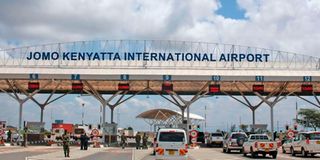
Motorists being subjected to security checks at the entrance of the Jomo Kenyatta International Airport in Nairobi.
Under the control of Gautam Adani — among Asia’s richest men with a wealth of $102 billion (Sh13.5 billion), according to the Bloomberg Billionaires Index — the sprawling Indian conglomerate with interests from power to ports is no stranger to controversy.
Adani Group has been subject to multiple government investigations that have alleged money laundering and corruption, but it was a private investigation in 2023 that may have come closest to deflating Gautam Adani’s empire.
New York financial firm Hindenburg Research last year called Adani Group “the largest con in corporate history,” alleging that the group had engaged in a long-running stock manipulation and accounting fraud scheme.
Citing a two-year investigation that included site visits and interviews with insiders, Hindenberg noted that most of Adani’s wealth has come amid gains in the market value of the conglomerate’s seven main listed companies. The value of these firms ballooned by an average of more than 800 percent in just three years, while the companies took on substantial debt that put them under near-term pressure to meet financial obligations, Hindenberg alleged.
The research group also leveled accusations that Adani family members have used offshore shell companies to generate illegitimate revenue for Adani Group firms and siphon money from the conglomerate’s publicly listed entities. Shell companies linked to Adani Group have also been used to hold vast swathes of Adani firm shares, in violation of Indian securities regulations, Hindenberg alleged.
Hindenberg is a so-called short seller, a type of trading firm that takes positions betting on the decline in value of a company’s shares, with short sellers often making public statements and releasing research to back up their bets.
In the case of Adani, Hindenberg’s report was initially crushing: shares in companies associated with the conglomerate plunged in value, wiping away some $150 billion in market capitalization in a matter of days and weeks. The stock of Adani’s flagship iron and coal mining and trading firm, Adani Enterprises, lost as much as 70% of its value.
The pain was not prolonged, however. Shares in Adani companies have pared their losses since the Hindenberg report, with many of the stocks trading near or even above levels seen before the damning allegations were made public.
Adani Group has resolutely denied Hindenberg’s claims. And while the Securities and Exchange Board of India (SEBI) continues to probe the conglomerate, it has been Hindenberg that has not come through unscathed. Last month, SEBI alleged that Hindenberg colluded with another U.S. investor in betting against Adani stock, in violation of Indian regulations. Hindenberg has in turn denied those allegations.






